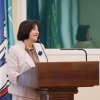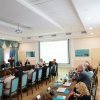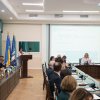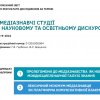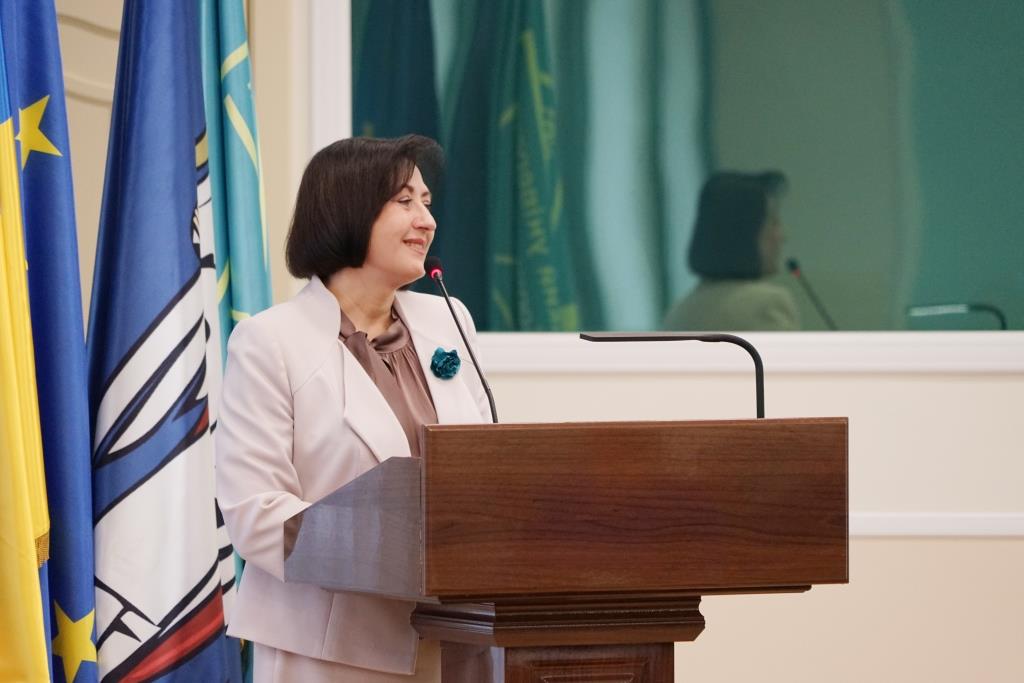
27 December, 2023
Borys Grinchenko Kyiv University
On December 27, 2023, the Academic Council of Borys Grinchenko Kyiv University approved an interim report on the implementation results of the research topic of the Faculty of Journalism "Media Studies in Scientific and Educational Discourses" (registration number: 0120U000064; duration: 2019-2024).
The results of the study in two areas for the period from December 2019 to December 2023 were presented by one of the project leaders, Viktoriia Ivashchenko, Deputy Dean of the Faculty of Journalism for Research, Professor of the Department of Media Production and Publishing, Doctor of Science in Philology, Professor.
During implementation of the research topic:
- at the first (preparatory/initial) stage (2019-2020): 1) the concept of the research was developed; 2) empirical bases for two study areas "Prolegomena to Media Studies as a New Interdisciplinary Field of Knowledge" and "Media Studies Lexical Minimum as a Platform for Communicative Interaction" were formed;
- at the second (main/research) stage (2021-2023), the research concept was implemented step by step: 1) the problem field of the study, its terminological and conceptual apparatus were outlined; 2) the history of the development of media theories and the formation of the main directions and structural subdivisions of media studies in scientific and educational discourses was traced; their classification by directions, schools, paradigms was carried out; media science was structured by its main subdivisions; 3) the world practice of creating media studies institutions, research media laboratories/media centers, and ECE programs of the media studies cycle was studied and implemented in the educational process of the Faculty of Journalism; 4) the experience of creating electronic multimedia educational terminology dictionaries, media platforms representing different types of remote discourses was analyzed and summarized; relevant typologies were developed; 5) the concepts for two projects of the Faculty of Journalism - "Media Hub of Grinchenko University" and "Lexical Minimum of a Media Expert" were developed; 6) in order to identify user requests the results of a survey on the use of the Lexical Minimum of a Media Expert in the educational process of the Faculty of Journalism were summarized.
The results of the theoretical and analytical searches were practically implemented through the creation and introduction to the educational process of the Faculty of Journalism:
- Grinchenko University Media Hub in the format of activities of the media education sector, media production sector and media research sector;
- an experimental model of the electronic educational resource (EER) " Lexical Minimum of a Media Expert " as a virtual laboratory.
The results of both research areas have been tested at the following levels:
- international – 1) observer status was obtained in the HORIZON 2020 "ELEXIS" international project (2018–2022) within the framework of the agreement between IJ/FJ and Josef Stefan Institute (Slovenia); 2) 3 international scientific and practical conferences, a methodological seminar for teachers of Girona University (Kingdom of Spain) and 9 scientific and practical seminars "Modern media studies: European experience of theory and practice in Ukraine" (2018–2023) were held; 3) the research results were tested at 5 international conferences; 4) 3 international grant applications were submitted: a) Erasmus Mundus Master in Professional Training for Spokesperson project, 2021; b) "Media Studies in European Dialogue" project (620639-EPP-1-2020-1-UA-EPPJMO-PROJECT); c) Horizon Europe MSCA Postdoctoral Fellowship "The Role of the Media in Cultural Diplomacy and Cooperation", University of Jaén (Kingdom of Spain); 6) participated in international surveys of research groups "ELEXIS", Josef Stefan Institute, (Republic of Slovenia, 2021) and "Terminologue", Dublin City University, EAFT Summit (Republic of Ireland, 2023);
- all-Ukrainian – 1) "Media Education" module was developed, 8 educational and training sessions were held; 2) 4 media projects were created, distributed in social networks and tested ("Kyiv holds the line. Chronicle", " WAR IS DIFFERENT LIFE", "My thoughts are (not) quiet", "Everyone can become a volunteer"); 3) published 6 monographs, 5 textbooks, 3 collections of conference abstracts, 12 scientific articles, which are indexed in the scientometric databases Scopus and Web of Science;
- university level - 1) monitoring of the level of media information literacy of participants of training sessions was conducted; 3) 10 academic disciplines with a "media studies" component and more than 150 disciplines representing the main areas and structural subdivisions of media studies wee developed; 4) formation of databases - knowledge, bibliographic, and terminological; media studies institutions and research media laboratories, media centers; EP and ESP of the media studies cycle; visual and audiovisual presentations, videos about terms uploaded to the EEP; monitoring surveys of students of the Media Education module; scientific papers and WPAD of the Faculty of Journalism, which include terms with a media component were
The next steps in the research of the scientific topic and its implementation are as follows:
- identifying the specifics of the formation of research areas of media studies in Slavic-speaking countries, analyzing media studies periodicals in these countries;
- an inventory of media studies institutions, media research centers and media laboratories, and EPs and ESPs in Slavic-speaking countries;
- further implementation of the activities of the media education, media production and media research sectors of Grinchenko University Media Hub project in terms of its implementation in the educational process of the Faculty of Journalism;
- completion of filling in the main sections of the Lexical minimum of a media expert;
- creation for the Lexical minimum of a media expert: a separate application, or a functional addition to the existing one, which will allow to edit terms and add new ones; mobile application for developed architecture; an application for forming a media library database.


